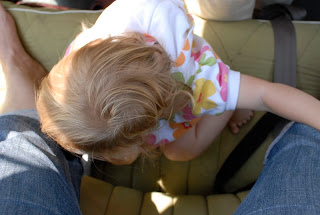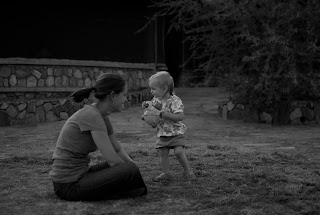I have been debating about this post for several days now, but I need to process something so I'm going to write about it. It involves sensitive information, but since you, our "readers", are all stateside I trust that you will help us maintain the privacy that this issue demands.
After returning from a night at the Tarangire Safari Lodge with some good friends from NC, I opened my email to learn (from an Arusha friend) that our nanny was suspected by her former employer (also an expat) of being HIV positive. In an email to me, this employer said that "Asina came to work one day with what looked like the chicken pox so we sent her to our friend", who was a doctor. Following her visit, that doctor called the employer and "alluded very strongly to the fact that she [Asina] was HIV positive". The employer, not wanting to confront Asina directly, gave her "ample opportunity to disclose this information to me, and since that day I have been operating under the assumption that she was [HIV positive]."
We were flabbergasted that this information had been concealed from us, but also a little understanding given the incredible culture of fear that surrounds HIV here. So, after soliciting (oh SO helpful) advice from doctors in Arusha and the states as well as HIV researchers from UNC and Duke, we decided that the risk of transmission to Eleanor was so "vanishingly small", and that the risk that someone else (i.e. a new nanny- a new nanny that Eleanor
did not know and love and trust) would also have the disease was so high, that we would continue to employ Asina.
With that decision made, next came the decision about how we were going to confront her. Tim is a HUGE proponent of honesty (does that surprise anyone to learn?!), so we decided that no matter how awkward we were going to be completely forthcoming. We played through every possible scenario of what we could say, and how she might react. We felt prepared for an long discussion, an awkward hour.
The one thing we never stopped to consider is that she had no idea about whether she was HIV positive or not. So when I asked her to come upstairs and I told her what we knew (suspected by your previous employer of being HIV positive based on your visit to the doctor that one time) she was shocked. Blindsided. She had no idea. Not only had she never, to her memory, consented to an HIV test, no one- not a doctor not her employer- had told her that she was in fact tested or that the test result showed that she was HIV positive.
"Well," we thought, " if you've never been tested then the doctor CAN'T know for certain that you are positive. This is a good thing." She told us, though, that the doctor did take blood, but then just gave her medicine and sent her home. An American doctor working in Arusha, a friend of ours, has since confirmed that tests (HIV tests in particular) are performed here without consent
all the time. It is horrifyingly commonplace.
The next 6 hours were spent getting her tested (the test was positive) and then trying to find someone that she could talk to- a doctor, a nurse, a councilor- someone. Anyone. Most of the time she just stared blankly. Empty. When she wasn't doing that she was crying. Weeping. When Tim asked her if there was anyone she could talk to- a friend, a family member- she just shook her head. "They will separate themselves from me, Tim," she said. "There is no one. I know them. It is best for me to just die. That is best."
We were SO HORRIBLY unprepared. I felt desperate. Tim seemed to hold it together pretty well, but we both knew that we could not leave her alone. Under no circumstances was that an option. We finally found someone to talk to, and by days end she has spoken with the leader of a support group for HIV positive people in Arusha, had liver function test results which showed that she was a candidate for ARVs, and learned that treatment was free (finally...good news?!). That night she sent a text message (which I will never forget) saying that when she first heard the news she was "thinking that it was just best to be killing by[sic] myself" but that with our help she was feeling better.
Tim and I still trying to come to terms with the experience, but are (1) amazed at the strength that Asina showed by getting tested, and (2) infuriated at a country that (a) understands so little about the disease that someone newly diagnosed can't share the news with most people because he/she will be completely ostracized and (b) allows for the testing of people without their consent and then DOES NOTHING with the information. What kind of doctor does that?
That night was I giving Eleanor a bath, laughing with her, and I suddenly felt immensely guilty. Here I was, in my fancy apartment, all the opportunity and freedom in the world, happily going about my (healthy) life and this woman, who has spent so much time with us, who cares for our daughter, is sitting in her one room house knowing that she is, and always will be, HIV positive. She will wake up the next day and have to face the reality that it was not a dream. It is real. What makes matters worse for me is, even knowing what I know about the real risks of transmission I still couldn't help feeling a little bit unsure- feeling a little like the chance (for infection of Eleanor) that we were taking by keeping Asina, no matter how small, was still too big.
Even now, though, reason still wins and Asina is still our nanny. We (Tim, Eleanor and I) are going to be as constant a support for her as we can. At least that is our hope.
Finally, I thought it prudent to share some of the information that was given to us regarding HIV transmission. It's one small, small thing that I can do to hep reduce the fear of this disease.
-kjd
Useful information
- The most risky practices for transmission include unprotected sexual contact, IV drug use, and direct blood-to-blood contact. The risks for transmission are very low even for sexual contact - on the order of <1/100 for male-to-female sexual exposures, and MUCH lower than that female-to-male. Generally, HIV is surprisingly NON-infectious.
- Household transmission risks are
extremely small. There are a couple documented anecdotes of household transmission out there (e.g., two sisters shared a razor), but it's really really rare. So rare that it's not really studied - we don't have much more than anecdotes. (Search Pubmed for "'household transmission' HIV" and you get 9 hits; "'casual transmission' HIV" gets 17 - only one since 2006.) People do AIDS hospice without getting HIV; for example, of 206 contacts of 90 AIDS patients had NO infections in median 23 months:
http://www.ncbi.nlm.nih.gov/pubmed/2118767
- Tears, saliva, and so on all have very small amounts of HIV in them, but even if someone skinned their knee and an infected person licked it clean (not that this would happen), the chances of actually passing HIV from that contact is really very very very small. The virus itself is quite fragile, and will die quickly when exposed to air.
- Taking ARVs lowers the risk of transmission even more.
- (CAVEAT: This is for someone in Eleanor's situation specifically, where the pretest risk is so low. See the comment below this post). When testing for HIV, a positive result is MUCH more likely to be a false positive than a true positive - so much more likely to be a false positive, that THREE consecutive positive ELISA tests in a row are as informative as flipping a coin. What does this mean? It seems that HIV is a screening problem with a VERY low pretest probability. If we call the pretest probability 1 in a million, and we say that ELISA antibody testing has a sensitivity of 100%, and a specificity of 99%, then the positive predictive THREE positive tests would give you a positive predictive value of 0.50. The FOURTH positive test in a row would give a PPV of 0.99. Bottom line: if you test positive, test again. It's better to give someone a false positive than a false negative. This is unfortunate, I suppose, but understandable.
- More information can be obtained
here, or
here for Tanzania specifically.





















































